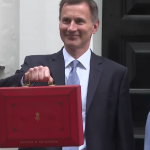Budget 2011: Retro Shock Doctrine as Thatcher’s Enterprise Zones return
In a display of loyalty to the memory of Margaret Thatcher (don’t get excited; she’s still alive), George Osborne today announced that now the Tories are back in power, they’re bringing back Enterprise Zones.
There will be 21 in total. Ten locations have been chosen by Osborne, so we will see EZs in Birmingham and Solihull; Leeds, Sheffield, Liverpool, Greater Manchester, the West of England, the Tees Valley, “North Eastern” (whatever that means), the Black Country, and Derbyshire/Nottinghamshire.
One will be in London, with a location to be chosen by the Mayor, whose judgment in development matters is of course legendary, and a further ten will be available for Local Enterprise Partnerships to bid competitively for.
The Enterprise Zones will offer low taxes and government handouts in exchange for locating businesses within them. Specifically, the Budget says that once established, an Enterprise Zone will enjoy access to:
- A 100 per cent business rate discount worth up to £275,000 over a five year period for businesses that move into an Enterprise Zone during the course of this Parliament;
- All business rates growth within the zone for a period of at least 25 years will be retained and shared by the local authorities in the LEP area to support their economic priorities;
- Government and local authority help to develop radically simplified planning approaches in the zone; and
- Government support to ensure superfast broadband is rolled out in the zone. This will be achieved through guaranteeing the most supportive planning environment and, if necessary, public funding.
The clear intention here, in classic Shock Doctrine style, is to exploit a clear need for economic investment to force the country to lavish gifts on the corporate interests in whose interests the Conservatives govern.
Over a quarter of a million pounds in cold, hard cash for each company. Permission to build inappropriate developments that reduce quality of life, deplete environmental resources, undermine local economies, or all three. We, the taxpayers, will even pay your multinational company’s phone bill.
The experience of these zones in the past is that they did much more to move jobs around than create them. Between 1981 and 1986, 63,300 jobs were created in Thatcher’s Enterprise Zones, but only 13,000 of these were new jobs. 80% of the jobs in the EZs had been displaced from elsewhere.
This one figure reveals a multitude of sins. Firstly, at a total programme cost of almost £300million, this means EZs delivered each new job at a cost of £23,000 (pdf), more than twice the average wage over the period 1981-86. Hiring workers directly into socially useful public works would have been cheaper and more effective, if ideologically abhorrent to the government of the day (or ours).
Second, each job moved to an enterprise zone means a job (and accompanying economic vitality) destroyed elsewhere. Since many of these Zones were out-of-town, this meant businesses abandoning the High Street in favour of tax-free, big-box locations on the urban fringe. One the few Enterprise Zones still considered ‘successful’ is that which created Gateshead’s MetroCentre shopping mall; but its record of success looks very different from the vantage point of Gateshead Town Centre.
Thirdly, the theory of the Enterprise Zone’s tax breaks is that they are at least additive. It may be low-taxed business, but that is better for the Exchequer than no business at all. But since we know most of the business had already existed outside the EZs, this theory breaks down. What we have instead is business currently contributing to local tax, being taken out of local tax, eroding the tax base with an accompanying hit to local services and public sector employment – costing even more jobs.
Because the breaks in an EZ can only ever be temporary, corporates treat them much as the savvy consumer does a 0% credit card offer. Many of the companies that took advantage of Scotland’s Enterprise Zones in the 1980s fled just as soon as the subsidies dried up. This can be minimised partly by basing business strategy on long-term conditions not short-term bungs, but is always going to be a feature of a plan dependent on inward investment rather than home-grown businesses.
The planning provisions for Enterprise Zones are terrifying – towns across the UK have had the life sucked out of them by parasitic out-of-town shopping centres and business parks, many of which were the legacy of the first generation of EZs. Our failure to envisage how we want our communities and landscape to look and behave is the source of so many of our problems, from air pollution to crime to underdevelopment.
Not only does Osborne see EZs as a new Wild West of developer-driven building with a minimum of planning, he announced plans to bring that laissez-faire ethos to the wider country, announcing that “there will be a presumption in favour of sustainable development where the default answer is ‘yes'”. Expect more demolition of valued town centres, more out-of-town boxes, more car dependency. Expect, basically, Northern Ireland, a corner of the Emerald Isle largely buried under low-density urban sprawl.
We do need more development, particularly in manufacturing, but that is not what Enterprise Zones are about. They are a microcosm of the anarchocapitalist conditions Tories ultimately want to see applied to the whole country; they are laboratories, showrooms, and a grateful present to corporate masters.
A real enterprise plan would involve fixed-capital grants managed by a real Green Investment Bank, with the proviso that any such capital return to public ownership if the beneficiary abandons it for overseas outsourcing. It would involve real, planned, walkable mixed-use communities where manufacturing space sits alongside residences and community services. It would aim to offer the world the best educated, most innovative and healthiest workers on the planet, and make it clear that the price companies pay for that quality is fair wages and world-class workers rights, including industrial democracy.
That’s what you’d do if you wanted an economy that delivers for the people of Britain. But if you only care about multinational bosses, why go to the bother?



excellent analysis.